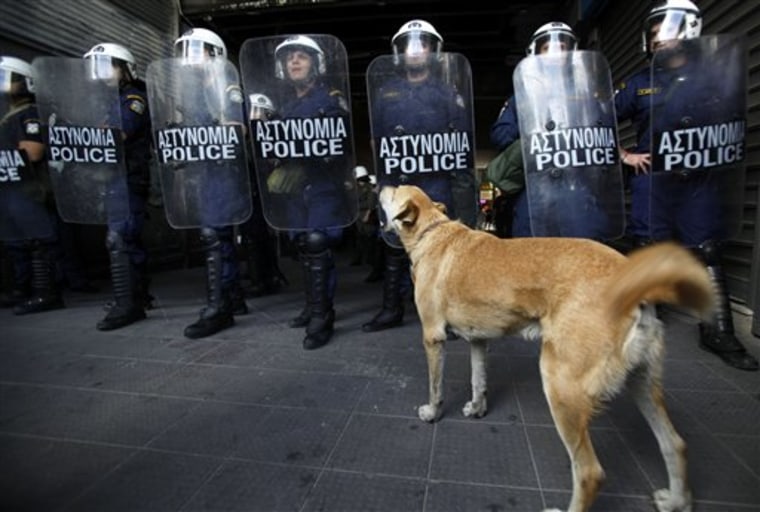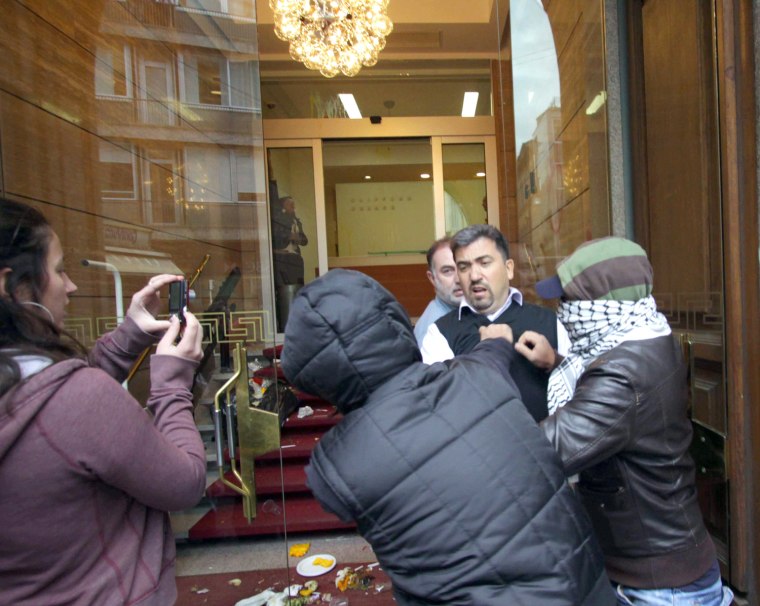For an October revolution, dress warm.
That's the word going out on the Web to rally street protests on Saturday around the globe from New Zealand to London, Frankfurt and, of course, New York.
Protesters got started early in Italy, where students managed to break into the hall of the Goldman Sachs building in the heart of Milan's financial district, a few steps away from La Scala opera house, police said. The protesters were quickly dispersed.
On Saturday, organizers hope to expand — nonviolently — to 951 cities in Europe, the United States, South America, Asia and Africa.
How many will show up, let alone stay to camp out in city centers as protesters have in New York's Occupy Wall Street protests, is anyone's guess. Rome police are gearing up for tens of thousands, but that protest bears a more traditional stamp, aimed at the austerity measures of Prime Minister Silvio Berlusconi's government.
Blogs and Facebook pages devoted to "October 15" — #O15 on Twitter — abound with exhortations to keep the peace, bring an open mind, a sleeping bag, food and warm clothing; in Britain, "Occupy London Stock Exchange" is at pains to stress it does not plan to actually, well, occupy the stock exchange.
That may turn off those with a taste for the kind of anarchic violence seen in London in August, at anti-capitalism protests of the past decade and at some rallies against spending cuts in Europe this year. But, as Karlin Younger of consultancy Control Risks said: "When there's a protest by an organization that's very grassroots, you can't be sure who will show up."
Concrete demands are few, other than a general sense that the the rich, and especially banks, should shoulder more of the tax burden, and that elected governments are not listening.
"It's time for us to unite; it's time for them to listen; people of the world, rise up!" proclaimed the Web site United for #GlobalChange. "We are not goods in the hands of politicians and bankers who do not represent us ... We will peacefully demonstrate, talk and organize until we make it happen."
"We have people from all walks of life joining us every day," said Spyro, one of those behind a Facebook page in London that has grown to have some 12,000 followers in a few weeks. Some 5,000 have posted that they will turn out.
Spyro, a 28-year-old graduate who said he has a well-paid job, told Reuters that he did not want his family name published. But he said the main target of the global protests was "the financial system."
For all such utopianism, the possibility that peaceful mass action, organized with the help of social media, can bring real change has been reinforced by the success of Arab uprisings this year.
"I've been waiting for this protest for a long time, since 2008," said Daniel Schreiber, 28, an editor in Berlin. "I was always wondering why people aren't outraged and why nothing has happened and finally, three years later, it's happening."
Quite what is happening, though, is hard to say. Here's what's expected Saturday in Europe and elsewhere:
ITALY
Police are preparing for tens of thousands to march in Rome against austerity measures planned by Berlusconi's beleaguered government. The demonstration is scheduled to start at 1200 GMT (8 a.m. EDT) in Rome.
On Friday, protests in Milan turned violent when students managed to break into the hall of the Goldman Sachs building in the heart of the financial district, a few steps away from La Scala opera house, police said.
Police quickly emptied protesters from the elegant building, though red graffiti was daubed on its walls expressing anger at Berlusconi and proclaiming "Give us money."
Protesters in Italy's financial capital also hurled eggs at the headquarters of UniCredit, the country's biggest bank.

GREECE
In crisis-ravaged Athens, where big protests have seen violence at times of late, a sense of fatigue and futility may limit numbers Saturday.
Protesting Greek unions vowed Friday to bring the government to a standstill next week, as uncollected trash piled up around Athens, traffic was snarled and more professions signed up for a 48-hour general strike Oct. 19-20 against the country's relentless austerity measures.
The strike is timed to coincide with a vote in parliament to pass new austerity measures. Air traffic controllers announced plans Friday to join the protest, promising to ground all flights on the two days of the general strike.
In Athens, buses, subway trains, trams and taxis were not running in the Greek capital Friday as public transport workers walked off the job for a second day.
GERMANY
Sympathy for southern Europe's debt troubles is patchy in Germany. The financial center of Frankfurt, and the European Central Bank in particular, is expected to be a focus of marches called by the Spanish-inspired Real Democracy Now movement.
A series of small bombs found on trains has stirred memories of the left-wing guerrilla attacks in the 1970s that grew from frustration at a lack of change after the student protests of 1968.
LONDON
British student protests a year ago were marked by acts of violence by what authorities called hard-core anarchists. Looting during protests in London in August were ascribed to political discontent mingled with criminal opportunism.
As an international center of finance, the City of London is a key target. But organizers know strong legal powers held by police make setting up a Wall Street-style protest camp far from easy.
"There's quite a bit of fatigue setting in," said one young veteran of last year's protests against higher university fees. "But if it's still going by Monday or Tuesday, I think that will excite students and they will head down. The City is much more the focus of people's anger now, compared to a year ago."
NEW ZEALAND
A long Saturday of rallies was planned. The Occupy Auckland Facebook page provided links recommending "suitable clothing ... a sleeping bag, a tent, food" — but, in a family-friendly spirit, strictly no drugs or alcohol.
Almost 2,000 protesters with tents and sleeping bags were expected to move into Auckland's Aotea Square Saturday afternoon, occupying it for the next six weeks.
Occupations were also promised in New Plymouth, Wellington, Christchurch, Dunedin and Invercargill.
CHINA
Asian authorities and businesses may have less to fear, because most of their economies are still growing strongly.
One editor from Asia Times Online, however, reported that the country’s new leftists were saluting the Occupy Wall Street movement as a “great revolution” against capitalism worldwide. Supporters of Occupy Wall Street reportedly have staged street protests in at least two cities of Henan province in recent days, the online news agency reported.
SPAIN
In Madrid, where thousands of young "indignados," or "angry ones," camped out for weeks earlier this year to protest economic conditions, many feel the movement has run out of steam since the summer.
Reuters and The Associated Press contributed to this report, as did msnbc.com staff.
